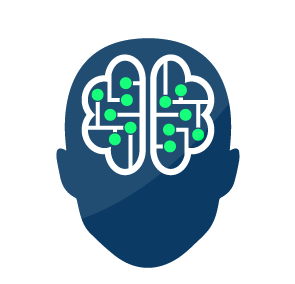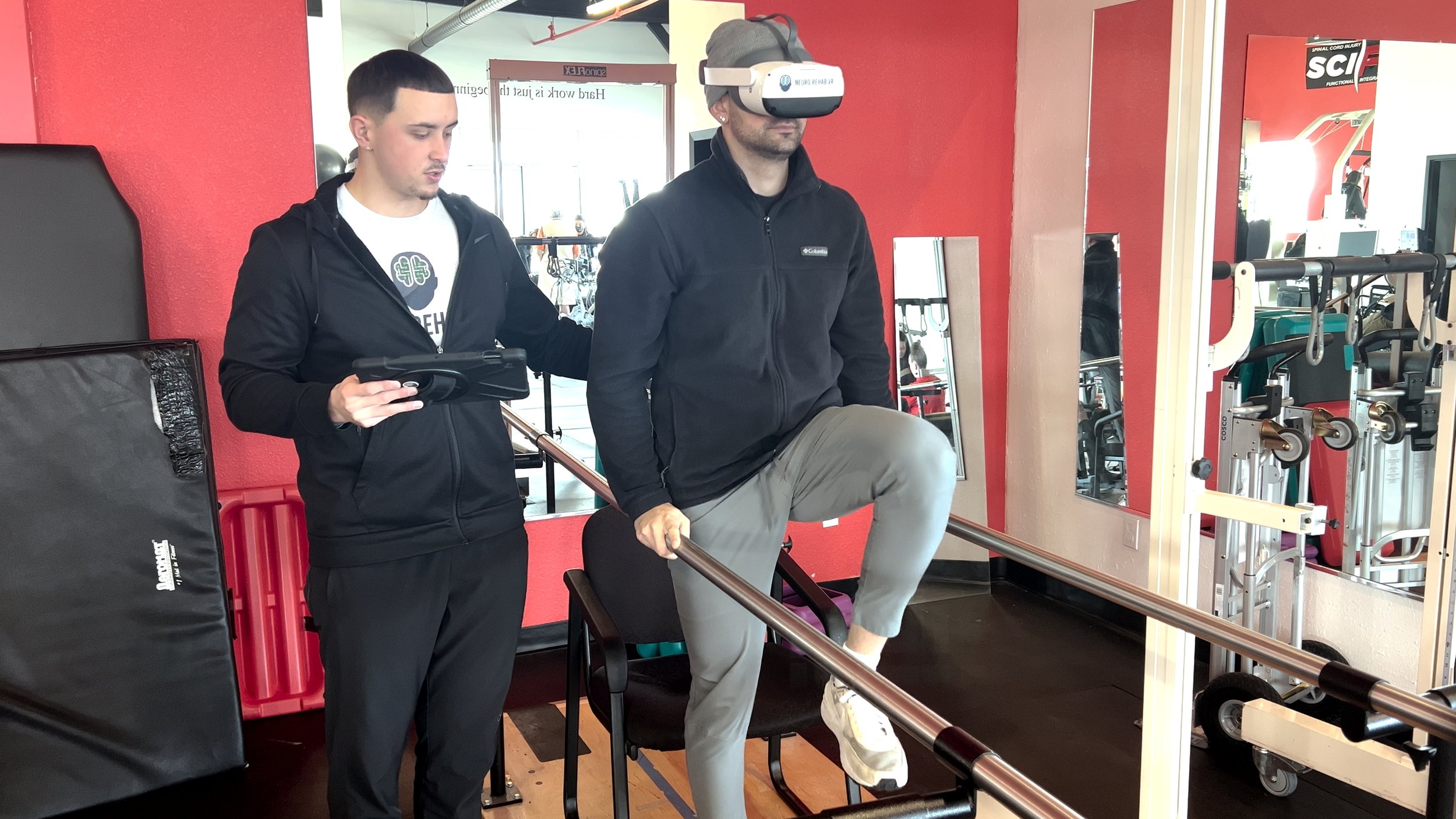Step Into Serenity: Easing Stress with Virtual Reality
Written by: Brianna Hodge
In today’s fast-paced, hyperconnected world, stress is more prevalent than ever. We juggle work, relationships, social media, and an overwhelming amount of information, leaving little room for mental wellness. The modern age has led to an increase in chronic stress, anxiety, and mental health disorders, with more people than ever searching for effective methods to manage their well-being. While traditional relaxation methods like meditation, exercise, and therapy have their place, technology is stepping in with innovative solutions. One of the most promising advancements in mental health is Virtual Reality (VR)—a digital tool that can transport users to peaceful environments, facilitate mindfulness, and even provide therapy. But how does it work? And more importantly, does it actually help? Let’s explore the science behind VR as a stress-relief tool and how it is shaping the future of mental wellness.
The Science Behind VR and Stress Reduction
Stress activates the sympathetic nervous system, triggering the classic fight-or-flight response. Chronic stress can lead to anxiety, depression, and even physical health issues like high blood pressure, cardiovascular disease, and a weakened immune system. Virtual Reality has been studied as a tool for stress reduction, showing promising results in reducing anxiety, improving mood, and lowering physiological stress markers.
-
A 2020 study published in JMIR Mental Health found that VR-based relaxation experiences significantly reduced stress and anxiety levels compared to traditional relaxation techniques (Seabrook et al., 2020). Participants using VR reported a greater sense of immersion, which led to deeper relaxation.
-
Another study on Immersive virtual reality demonstrated that VR meditation apps help lower cortisol, the stress hormone, after just 10 minutes of use (McGarry, Sarah, et al). This suggests that even short VR sessions can have meaningful effects on stress levels.
-
Research published in the Annual Review of CyberTherapy and Telemedicine showed that VR exposure therapy was effective in reducing generalized anxiety disorder symptoms, allowing patients to practice relaxation techniques in a simulated environment (Wiederhold, Brenda.).
-
A systematic review in Frontiers in Psychology highlighted VR as a highly effective medium for mindfulness and relaxation training, showing that users experienced greater emotional regulation and reduced stress compared to traditional meditation techniques (Nuru Jingili, et al.).
One key reason VR is effective for stress relief is immersion. Unlike traditional relaxation methods, where external distractions can interrupt the experience, VR fully absorbs users into a different world. This helps individuals reach a state of mindfulness faster, allowing them to disconnect from daily worries.
The Power of Being Present
One of the biggest challenges of stress relief is simply being present. When your mind races, it’s hard to focus on deep breaths or the warmth of the sun on your skin. But VR takes you to a place where worries fade. Instead of struggling to meditate in a noisy apartment, you can find yourself on a quiet beach at sunset, hearing the waves roll in. Instead of closing your eyes and imagining a peaceful forest, you can step inside one, seeing the trees sway and feeling a sense of calm wash over you.
This ability to transport people into peaceful environments has been backed by research. Studies show that VR-based relaxation can lower stress hormone levels, reduce anxiety, and even improve mood after just a few minutes of use. The study published in JMIR Mental Health found that VR relaxation experiences led to significantly greater reductions in stress compared to traditional relaxation techniques (Seabrook et al., 2020). Similarly, research in Frontiers in Psychology concluded that VR-assisted mindfulness training enhanced emotional regulation and provided deeper relaxation (Lee, Jungjoo, et al. ).
The Psychological and Physiological Effects of Stress Reduction in VR
Beyond relaxation, VR can have significant psychological and physiological benefits. Stress is known to elevate cortisol levels, impair cognitive function, and weaken the immune system. Regular engagement with VR-based relaxation techniques has been shown to reduce cortisol levels, lower heart rates, and improve emotional resilience.
A study found that participants using VR-guided meditation showed a 30% reduction in cortisol levels compared to those using traditional meditation techniques (University, Carnegie Mellon. ). Additionally, the Mixed Methods Study also concluded that VR-based mindfulness therapy significantly improved cognitive flexibility, mood stability, and self-compassion in individuals experiencing chronic stress (Seabrook).
More Than Just an Escape
While VR can offer a momentary escape, its benefits go deeper. Researchers have explored how VR can be used as a tool for mindfulness and therapy, with promising results. A study published in Scientific Reports observed that exposure to virtual natural environments significantly reduced feelings of stress and improved overall well-being (Spano, Giuseppina, et al. ).
Beyond mindfulness, VR is being integrated into therapy for anxiety, PTSD, and even chronic pain management. A meta-analysis in The Journal of Affective Disorders found that VR-based cognitive behavioral therapy (CBT) was effective in reducing symptoms of anxiety and PTSD, making it a promising tool for long-term mental wellness (Heo, Seoyoon, and Jin-Hyuck Park. ). Traditional therapy can feel intimidating or inaccessible for some, but VR provides an interactive, engaging way to build coping skills. The immersive nature of VR helps people feel present and engaged, making it easier to practice mindfulness techniques or exposure therapy in a safe, controlled way.
Other Studies and programs on PTSD have highlighted how VR is also proving beneficial for veterans. Programs such as Bravemind, developed by the University of Southern California’s Institute for Creative Technologies, use VR exposure therapy to help individuals process trauma in a controlled setting. A Journal of Anxiety Disorders study found that veterans using VR-based exposure therapy reported a 56% decrease in PTSD symptoms compared to those in traditional therapy settings (Maples-Keller, Jessica L., et al.).
Real-World Applications: Neuro Rehab VR
Among the pioneers in VR-based stress management is Neuro Rehab VR, a company that specializes in smart rehabilitation solutions that merge immersive technology with clinical insights. While primarily focused on neurorehabilitation, Neuro Rehab VR has developed therapeutic VR experiences that promote mental wellness alongside physical rehabilitation.
For individuals undergoing stroke recovery or neurological rehabilitation, stress and anxiety can be major roadblocks to progress. Neuro Rehab VR’s interactive therapy sessions not only help patients regain motor functions but also provide calming, gamified experiences that reduce stress during recovery. By engaging users in customized, immersive therapy, the system lowers psychological distress, making rehabilitation more effective and enjoyable.
Clinical trials and real-world case studies support these findings. Patients using Neuro Rehab VR have reported lower anxiety, improved mood, and greater motivation to participate in therapy. This highlights how VR is not just a tool for physical recovery but also a holistic wellness solution that addresses both the mind and body.
The Future of Digital Wellness
The beauty of VR is that it meets you where you are. Whether you need a few minutes to reset after a stressful day or a structured therapy tool to help manage anxiety, VR has the potential to revolutionize mental wellness. As technology advances, we will see even more personalized VR experiences designed to fit individual needs, making stress relief more accessible than ever.
VR companies are already integrating artificial intelligence (AI) to enhance mental wellness experiences. AI-driven VR therapy will soon be able to adapt in real-time to users’ emotions by analyzing biometric data such as heart rate variability and facial expressions. This could create fully customized, highly effective stress-reduction programs tailored to an individual's emotional state at any given moment.
If you’ve ever felt like stress is taking over your life, know that you’re not alone. And know that there are new, innovative ways to help you find relief. VR is not just a tool for entertainment—it’s a tool for well-being, and its potential is just beginning to unfold.
-
Heo, Seoyoon, and Jin-Hyuck Park. “Effects of Virtual Reality-Based Graded Exposure Therapy on PTSD Symptoms: A Systematic Review and Meta-Analysis.” International Journal of Environmental Research and Public Health, vol. 19, no. 23, 29 Nov. 2022, p. 15911, https://doi.org/10.3390/ijerph192315911.
Lee, Jungjoo, et al. “The Impact of Immersive Virtual Reality Meditation for Depression and Anxiety among Inpatients with Major Depressive and Generalized Anxiety Disorders.” Frontiers in Psychology, vol. 15, 21 Oct. 2024, https://doi.org/10.3389/fpsyg.2024.1471269.
Maples-Keller, Jessica L., et al. “The Use of Virtual Reality Technology in the Treatment of Anxiety and Other Psychiatric Disorders.” Harvard Review of Psychiatry, vol. 25, no. 3, 2017, pp. 103–113, https://doi.org/10.1097/hrp.0000000000000138.
McGarry, Sarah, et al. “Immersive Virtual Reality: An Effective Strategy for Reducing Stress in Young Adults.” British Journal of Occupational Therapy, vol. 86, no. 8, 1 Apr. 2023, p. 030802262311656, https://doi.org/10.1177/03080226231165644.
Nuru Jingili, et al. “A Systematic Review on the Efficacy of Virtual Reality and Gamification Interventions for Managing Anxiety and Depression.” Frontiers in Digital Health, vol. 5, 7 Nov. 2023, https://doi.org/10.3389/fdgth.2023.1239435.
Seabrook, Elizabeth, et al. “Understanding How Virtual Reality Can Support Mindfulness Practice: Mixed Methods Study.” Journal of Medical Internet Research, vol. 22, no. 3, 18 Mar. 2020, p. e16106, www.jmir.org/2020/3/e16106/, https://doi.org/10.2196/16106.
Spano, Giuseppina, et al. “Virtual Nature and Psychological and Psychophysiological Outcomes: A Systematic Review.” Journal of Environmental Psychology, vol. 89, 1 Aug. 2023, pp. 102044–102044, https://doi.org/10.1016/j.jenvp.2023.102044.
University, Carnegie Mellon. “Press Release: Only 25 Minutes of Mindfulness Meditation Alleviates Stress, according to Carnegie Mellon Researchers - News - Carnegie Mellon University.” Www.cmu.edu, www.cmu.edu/news/stories/archives/2014/july/july2_mindfulnessmeditation.html.
Wiederhold, Brenda. “Annual Review of CyberTherapy and Telemedicine .” Vrphobia, vrphobia.com/Research/Publications/ARCTT2007.pdf.






